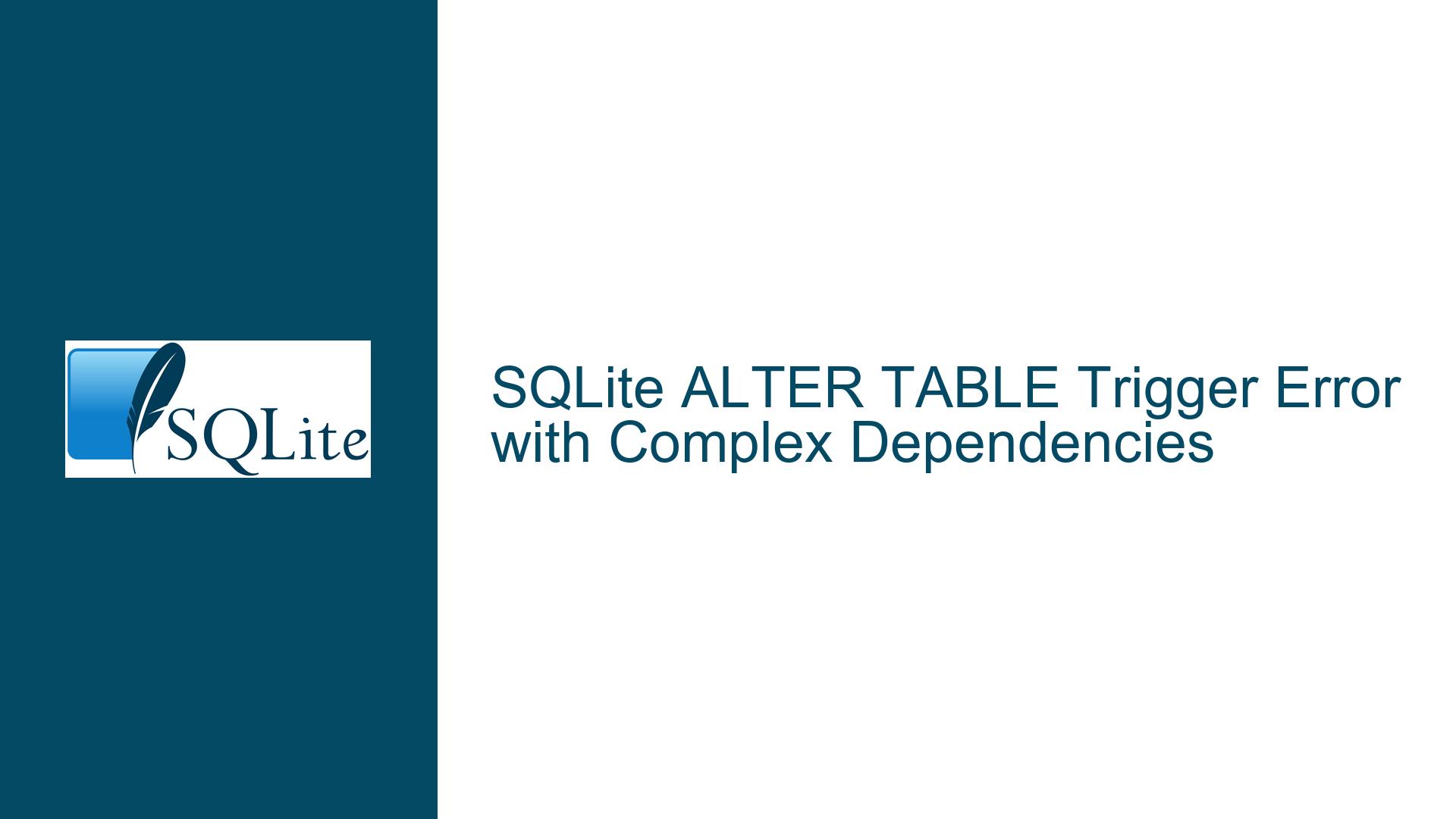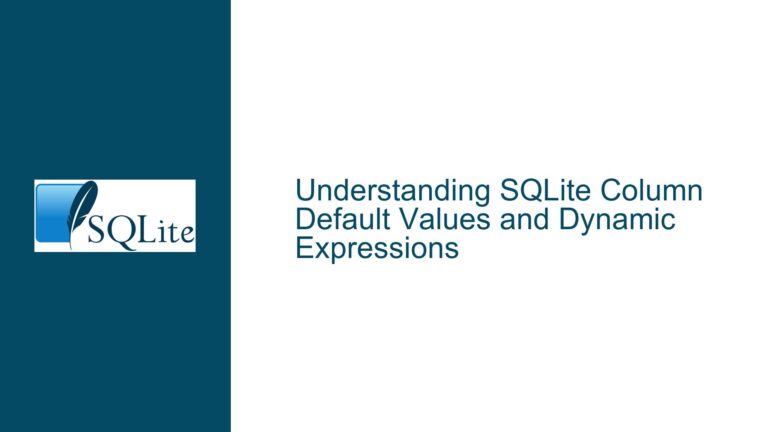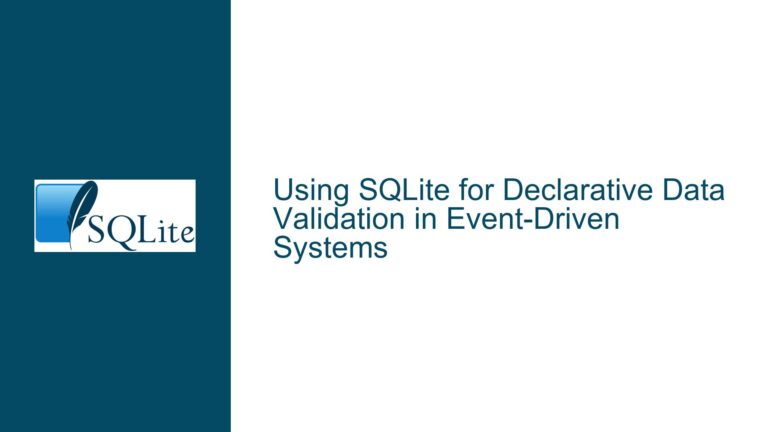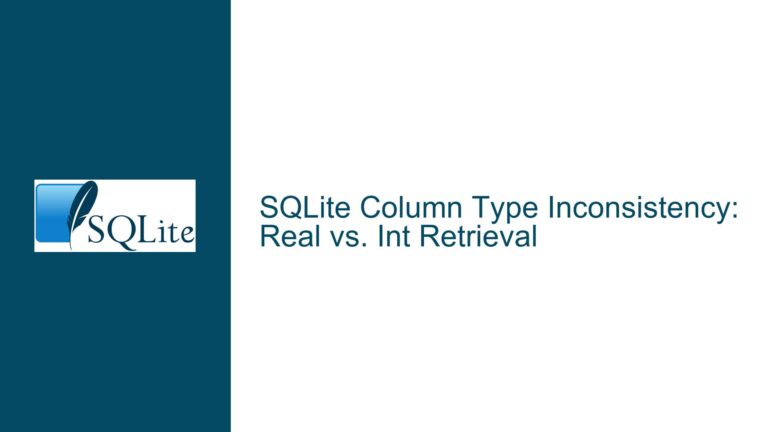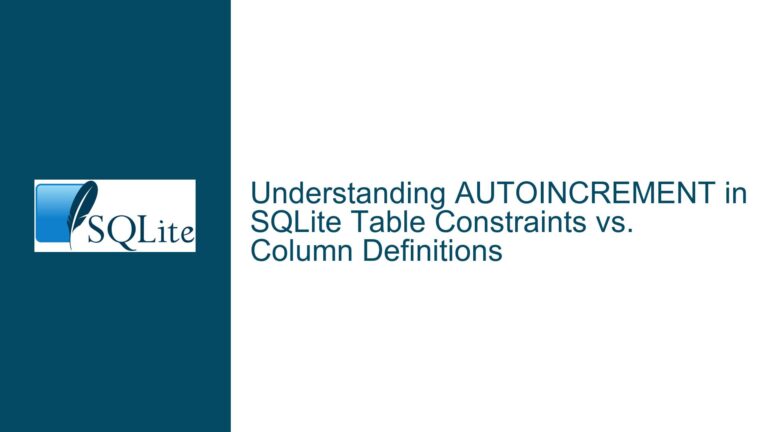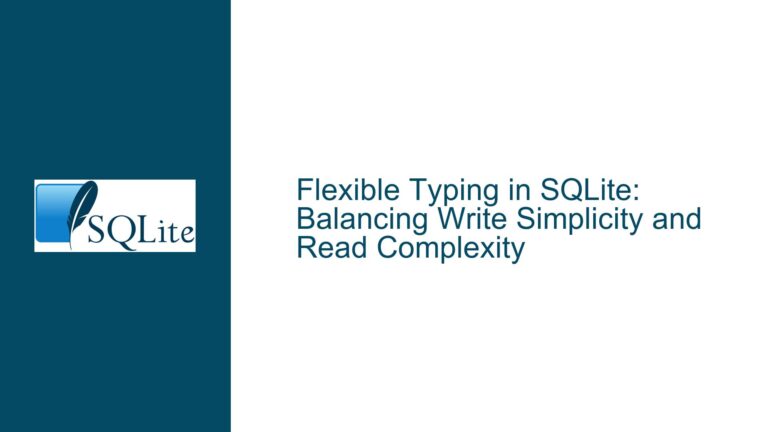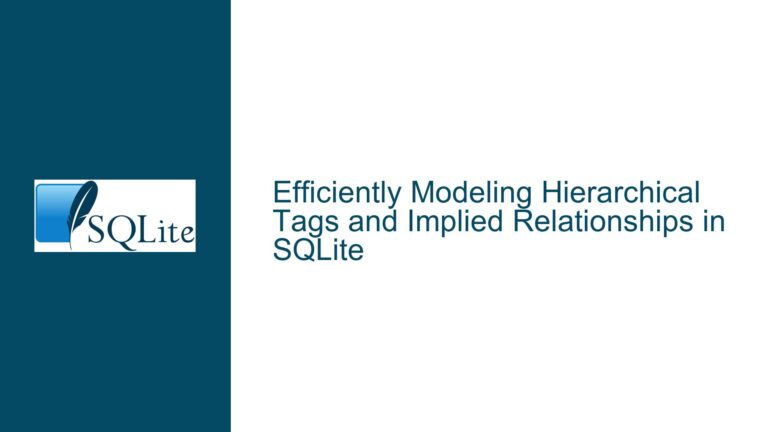SQLite ALTER TABLE Trigger Error with Complex Dependencies
ALTER TABLE Fails Due to Trigger Referencing Dropped Table
When performing an ALTER TABLE operation in SQLite, particularly when renaming or replacing a table that is referenced by a trigger, errors can arise if the trigger’s dependencies are not properly managed. In this scenario, the error message "no such table: main.enclave" indicates that the trigger update_eff_perm is attempting to reference the enclave table, which has been dropped during the ALTER TABLE operation. This issue is exacerbated by the fact that the trigger is complex, involving a subquery that references the enclave table.
The core of the problem lies in the way SQLite handles schema changes, especially when triggers are involved. SQLite’s schema alteration mechanism, particularly after version 3.25, introduced improvements to the ALTER TABLE command, allowing for more sophisticated schema modifications without requiring the legacy_alter_table pragma. However, these improvements can sometimes lead to unexpected behavior when triggers reference tables that are being altered or dropped.
In this case, the trigger update_eff_perm is defined to fire after an update on the guests table. It references the enclave table to determine the maximum permission level (max_perm) for a guest. When the ALTER TABLE operation is executed, the enclave table is dropped and replaced with enclave2. However, the trigger’s definition is not automatically updated to reflect this change, leading to the error when the trigger attempts to reference the now-dropped enclave table.
Trigger Dependencies and Schema Changes in SQLite
The root cause of this issue is the interaction between SQLite’s schema modification mechanism and the way triggers are handled during such operations. When a table is dropped and replaced, SQLite does not automatically update the definitions of triggers that reference the dropped table. This is particularly problematic when the trigger contains complex logic, such as subqueries or joins, that depend on the dropped table.
In the given example, the trigger update_eff_perm references the enclave table in its UPDATE statement. When the ALTER TABLE operation is performed, the enclave table is dropped, and the trigger’s reference to it becomes invalid. This is why the error "no such table: main.enclave" is produced. The issue is not present when the trigger is simplified to only reference the guests table, as the ALTER TABLE operation does not affect the guests table directly.
The PRAGMA legacy_alter_table pragma can be used to revert to the pre-3.25 behavior, where the entire schema is rewritten during an ALTER TABLE operation. This pragma ensures that all triggers and other dependencies are updated to reflect the new schema. However, the documentation suggests that this pragma should not be necessary for most use cases, implying that the behavior observed here is not the intended outcome.
Another factor contributing to this issue is the order in which schema changes are applied. SQLite processes schema changes in a specific sequence, and if a trigger references a table that is dropped before the trigger is updated, the reference will become invalid. This is particularly problematic in complex schemas where multiple tables and triggers are interdependent.
Resolving Trigger Dependency Issues During ALTER TABLE
To resolve the issue of triggers referencing dropped tables during an ALTER TABLE operation, several strategies can be employed. The most straightforward approach is to use the PRAGMA legacy_alter_table pragma, which forces SQLite to use the older schema modification mechanism. This pragma ensures that all triggers and other dependencies are updated to reflect the new schema, preventing references to dropped tables.
However, if the goal is to avoid using the legacy_alter_table pragma, alternative strategies must be employed. One such strategy is to manually drop and recreate the trigger after the ALTER TABLE operation. This ensures that the trigger’s definition is updated to reflect the new schema. In the given example, the trigger update_eff_perm would need to be dropped before the ALTER TABLE operation and recreated afterward.
Another approach is to use temporary tables to stage the schema changes. In this approach, the enclave table would be copied to a temporary table, the original enclave table would be dropped, and the temporary table would be renamed to enclave. This approach ensures that the trigger’s reference to the enclave table remains valid throughout the schema modification process.
Below is a detailed step-by-step guide to resolving the issue:
Disable Foreign Key Checks: Begin by disabling foreign key checks to prevent any constraints from interfering with the schema modification process. This is done using the
PRAGMA foreign_keys=OFFcommand.Drop and Recreate the Trigger: Before performing the
ALTER TABLEoperation, drop the triggerupdate_eff_permto ensure that it does not reference theenclavetable during the schema modification. After theALTER TABLEoperation is complete, recreate the trigger with the updated schema.Perform the ALTER TABLE Operation: Create a new table
enclave2with the desired schema changes. Copy the data from the originalenclavetable toenclave2. Drop the originalenclavetable and renameenclave2toenclave.Recreate the Trigger: After the
ALTER TABLEoperation is complete, recreate the triggerupdate_eff_permwith the updated schema. Ensure that the trigger’s definition references the newenclavetable.Enable Foreign Key Checks: Finally, re-enable foreign key checks using the
PRAGMA foreign_keys=ONcommand.
Here is the modified SQL script that implements these steps:
PRAGMA foreign_keys=OFF;
BEGIN TRANSACTION;
-- Drop the trigger to prevent references to the old table
DROP TRIGGER update_eff_perm;
-- Create the new table with the desired schema
CREATE TABLE enclave2 (
active INTEGER DEFAULT 1,
max_perm INTEGER
);
-- Copy data from the old table to the new table
INSERT INTO enclave2 (active, max_perm)
SELECT active, max_perm FROM enclave;
-- Drop the old table
DROP TABLE enclave;
-- Rename the new table to the old table's name
ALTER TABLE enclave2 RENAME TO enclave;
-- Recreate the trigger with the updated schema
CREATE TRIGGER update_eff_perm
AFTER UPDATE OF perm ON guests
FOR EACH ROW WHEN OLD.perm <> NEW.perm
BEGIN
UPDATE guests
SET perm = min(NEW.perm, (SELECT max_perm FROM enclave WHERE active=1))
WHERE name = NEW.name;
END;
-- Check for foreign key violations
PRAGMA foreign_key_check;
COMMIT;
PRAGMA foreign_keys=ON;
By following these steps, the issue of triggers referencing dropped tables during an ALTER TABLE operation can be effectively resolved. This approach ensures that the schema modification process is handled correctly, and the trigger’s dependencies are properly managed.
In conclusion, while SQLite’s ALTER TABLE improvements in versions 3.25 and later provide significant benefits, they can also introduce complexities when dealing with triggers that reference tables being altered. By understanding the underlying mechanisms and employing appropriate strategies, these issues can be effectively mitigated, ensuring a smooth schema modification process.
